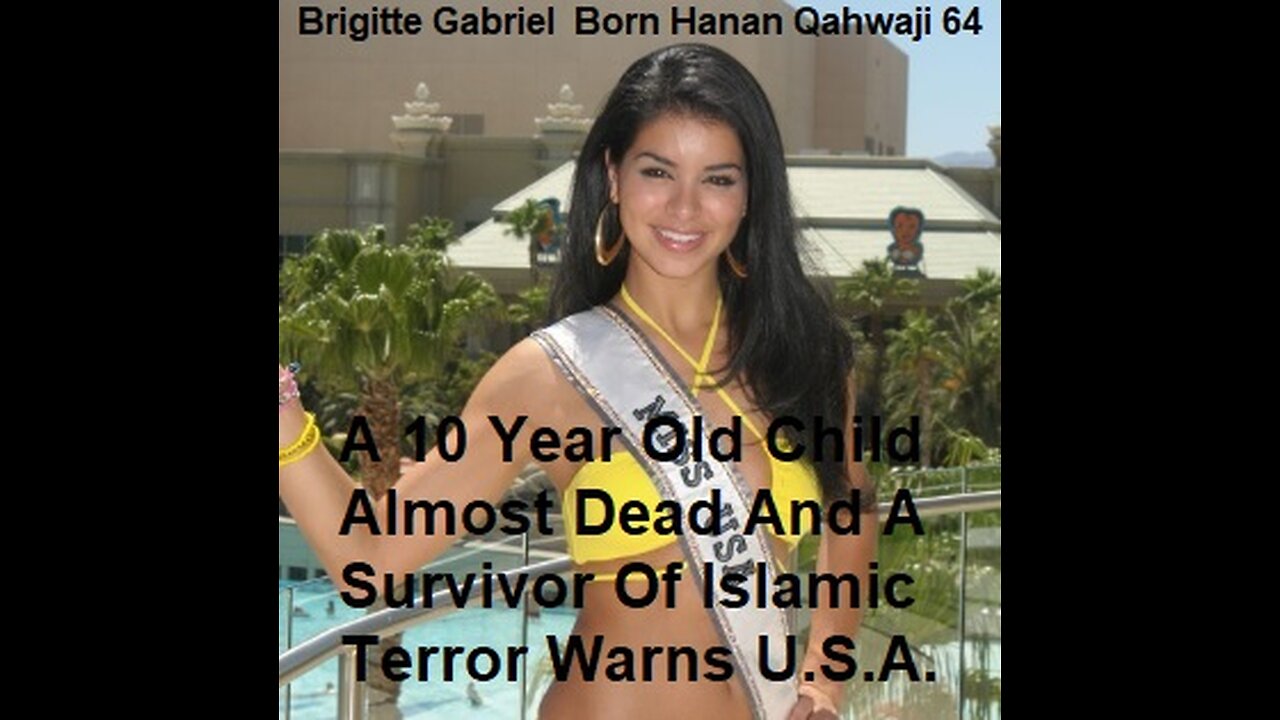Premium Only Content

A 10 Year Old Child Almost Dead Is A Survivor Of Islamic Terror Warns America Now
American Muslims Face Growing Prejudice Ten years after the 9/11 attacks, America's Muslims have become the country's internal enemy. Conservative forces have seized upon the so-called "Ground Zero Mosque" as a rallying point. Amid all the hate, Americans have lost sight of the real problem: the fact that their country has become paranoid.
Even on hot summer days in Virginia, Brigitte Gabriel receives visitors looking as if she were dressed for the opera. She has her hair teased up, copious amounts of pearls adorning her neck and arms, and her feet clad in rhinestone-studded sandals. This is her uniform in the war against what she sees as the barbarians of radical Islam. On three occasions, Gabriel has been the subject of declarations by al-Qaida, she says, and her name is probably on various death lists. Indeed, Gabriel, who emigrated to the US years ago from Lebanon, is America's siren on all things Islamophobic, and her speeches are one indication of how the country may have changed since the attacks of September 11.
Gabriel's position can be summarized as follows: The US is suffering from terminal cancer and is infected with rampant Islamist cells that are eating away at the country, its liberties and its constitution. "Our enemy," writes Gabriel, "is not an organization of people living overseas plotting to attack. Our enemies are the neighbors next door, the doctors practicing in our hospitals, and the workers who share our lunch break. Our enemies are terrorists driven by a dangerous ideology and clothed in deception who operate under cover and laugh about the advantages our sensitivity training, gullibility, and political correctness give them."
Some 300,000 copies of Gabriel's first book, which contains these sentences, have been distributed. TV stations now set aside ample airtime for her and her ideas. She has been invited to give presentations to US Senate committees, the FBI, the US Special Operations Command, the Joint Forces Staff College, the Republican Party, the Tea Party movement and Christian conferences. Brigitte Gabriel, who pronounces her name as if it were French, is an idol in the conservative half of America's deeply divided society -- but remains a reviled figure in the other half.
On the Death Lists
Speaking face-to-face, she seems much nicer than the woman who she is on TV, where her interviews often sound like fanatical yapping. The interview with SPIEGEL took place in a palatial home on the Atlantic coast, with windows that look out over a finely manicured lawn.
She is staying here with friends, she says, but it feels as if she has invited us into her own home. The living room matches her style, with cathedral ceilings and expensive furniture made of chrome and leather, but the question of where she lives remains open. Her whereabouts have to be kept secret, she says, because of al-Qaida -- and the death lists. A man with a revolver is standing guard at the door.
By way of introduction, Gabriel recounts the story of her childhood. It is the story of a Christian family that survived the mayhem of civil war in Lebanon. She talks about the ordeal of a young woman who watched helplessly as her home fell into the clutches of Muslim fanatics. She recounts how Lebanon, which once had a Christian majority, became a Muslim country. Her point is that the same thing cannot be allowed to happen to America.
Gabriel contends that until Sept. 11, 2001 she was an apolitical woman who wanted to enjoy life. But the attacks of that day reopened old wounds, she says. "I was sitting here," she recalls, as her eyes turn a steely gray, "in America, 8,000 miles away, 20 years later, and I had to answer the same question from my own children that I had asked my father: Why are they doing this to us?" Her father's answer, slightly modified, became the title of her first book: "Because They Hate."
She founded the organization ACT! for America, which was initially called the American Congress for Truth. Today, she says, it boasts 170,000 members across the country: "We are the largest grassroots movement for national security." Local groups are encouraged to take action against overly politically correct teachers, excessively tolerant members of Congress and local newspapers that publish "derogatory" articles about the US or Israel. ACT! for America, says Gabriel, is a rallying point for "people who are fighting to save America."
Asleep at the Wheel
There is no shortage of such people. Republican Tom Tancredo from Colorado is one of them. He ran for president in 2008 on a platform that included the idea of thwarting future terror attacks by threatening to carry out retaliatory air strikes against Mecca and Medina. Saxby Chambliss, now a senator, is also one of these fighters. During his election campaign, he voiced support for arresting every Muslim right at the border of his home state of Georgia. The list also includes Newt Gingrich, the perpetual contender for the Republican nomination to the White House, who deliberately uses unfortunate choices of words to equate Islam and Nazism. Leading the struggle against Islam is Fox News' star presenter Bill O'Reilly, the most venomous pundit on the American right, who appears to see the Koran as nothing more than a type of "Mein Kampf."
To support her ideas, Gabriel jumps from the 7th to the 21st century and back, from the suras of the Koran to Europe's transformation into "Eurabia," from the Islamic militant group Hezbollah to American textbooks, and from the Crusades to the massacre of Israeli athletes during the Munich Olympics (which she seems to think took place in 1971, rather than 1972). She juggles Hitler and Iran's Ayatollah Khomeini and explains why each and every devout Muslim is a potential terrorist, and how all the pieces fit together in one grand scenario of doom: America is being infiltrated. Sharia law is coming soon. The government is looking away. Government agencies are asleep at the wheel.
The problem has less to do with the fact that nothing, or next to nothing, of what Gabriel and her disciples are spreading among the American people is actually true. The problem is that many Americans -- perhaps half, perhaps the majority -- see the world today in a very similar way. This is an ideological delusion that often surfaces in countries where there are rampant fears of social decline and economic crises are underway.
Scapegoats are needed. It is necessary to invoke America's powerlessness to more energetically rally the people to action. But the mere assertion that the US government and its agencies are unprepared to meet an Islamist threat is a grotesque piece of misinformation, one which is constantly repeated by America's conservatives. In fact, the opposite is true. America is actually running the risk of becoming a police state.
Growing Apparatus
In its series "Top Secret America," which was published in July 2010, the Washington Post has done remarkably meticulous research that shows how the government has expanded the US domestic and foreign security apparatus since 9/11. The newspaper reported that 263 new agencies have been created over the past decade to help fight the war on terror, and that today a total of 1,271 government organizations are more or less directly involved in protecting the country against attacks. This has resulted in an apparatus with 10,000 branches throughout the country that employs 854,000 people and occupies three times more office space in Washington than the Pentagon.
Working in close cooperation with the CIA, the New York City Police Department has established a type of intelligence service, which is right on the verge -- or beyond -- of what is legally permissible because it specifically targets Muslims in surveillance operations. In neighborhoods with large Muslim populations, undercover agents have been placed to keep their ears open in bookstores, mosques and even ethnic beauty salons, without any prior suspicion that preparations are being made to commit a crime. This means that the simple fact of being a Muslim constitutes just cause for suspicion these days, at least in the eyes of New York's finest. That is a far cry from the good old America that liked to see itself as "the land of the free and the home of the brave," in the words of its national anthem.
It seems almost embarrassing to have to point out that Muslims in America are doctors and taxi drivers, waiters and mathematicians, dancers and soldiers, ice cream vendors and teachers. They have families, take picnics in the park on Saturdays, and only want the best for their children. Many of them are fans of the New York Yankees or ardent supporters of the Boston Celtics. Miss USA 2010 was Rima Fakih, a Muslim woman in a bikini; she is also a good indication that the world might be very different from what Gabriel and her followers imagine.
The US's Long Muslim History
You would think that in a modern country like the US it would be patently obvious that all this crude talk about "the" American Muslims is completely groundless in view of the complex social fabric of this country, which still absorbs a million immigrants every year. The US also has a long Muslim history of its own, which includes such great Americans as Malcolm X and Muhammad Ali.
Muslims can now expect to be regularly subjected to special treatment at checkpoints in airports, and sometimes they have to comfort their children after they have been called terrorists by their school classmates. They are shocked when, for example, a Muslim taxi driver is murdered in New York, when a plastic pig is placed in a mosque in Madera, California, or when building materials for a mosque go up in smoke in Murfreesboro, Tennessee.
It is odd that today's anti-Islamic sentiment, which now often feels like the social mainstream, did not ignite until long after 9/11. During the first few years after the attacks, even while former US President George W. Bush was still in office, there may have been the occasional verbal slip in the "marketplace of ideas," which Americans hold sacred. But an overwhelming majority of Americans, including Bush and the conservatives, did its best to avoid any knee-jerk equating of Islam and terrorism, and of American Muslims and al-Qaida.
This consensus came to an abrupt end almost exactly one year ago. It didn't come in response to a new terror plot or a successful attack, but rather to a plan presented by an imam, known for his enlightened views, who wanted to build an Islamic cultural and community center modeled after the YMCA -- located two blocks from New York's Ground Zero.
Disregard for Truth
Initial reports on "Park 51" were released in December 2009, but escaped the attention of conservative firebrands. It wasn't until months later that influential bloggers like Pamela Geller (who writes the blog "Atlas Shrugs") and Robert Spencer ("Jihad Watch") recognized the issue's potential for their websites, and Gabriel inevitably joined the chorus of protests. Thanks to their efforts, this so-called desecration of the site of the attacks by a so-called "Ground Zero Mosque" was elevated to the national agenda.
At the time, the number of clicks on the corresponding websites went through the roof. Not long thereafter, on the ninth anniversary of the attacks, the first noisy demonstrations were held in front of the building that housed the old Burlington Coat Factory in Lower Manhattan, at 51 Park Place.
Even today, groups and clusters of individuals still gather in front of the building, carrying signs with messages like: "All I need to know about Islam I learned on 9/11." Sometimes relatives of attack victims mingle with the crowd, sometimes politicians from Washington put in an appearance. These are street festivals of patriotic fervor, with a total disregard for substance and truth.
Although Islamophobic bloggers and their followers claim that militant Islam intends to build a place of worship at the site of its greatest triumph, there are a plethora of reasons why this assertion has been wrong right from the start. The plan is the brainchild of Imam Feisal Rauf, who is known for his determination to engage in an intercultural dialogue. New York Mayor Michael Bloomberg supports the project, as does President Barack Obama, at least halfheartedly, and it is interesting to note that opinion polls show that the majority of the residents of Manhattan are also in favor of the cultural center.
Rubbing Shoulders in the Sandwich Shop
It's a different story, though, beyond the East River and the Hudson, and even more so in the distant cities and regions of this vast country. People across America have allowed themselves to be swept up by the controversy that a mosque built on the mass grave of Ground Zero is an affront. Amidst all the commotion, the critics conveniently overlook the fact that a mosque was never planned in the first place. Instead, the organizers say that it was always intended to be "a platform for multi-faith dialogue" -- with a prayer room, yes, but there were also Muslim prayer rooms in the towers of the World Trade Center.
Park Place, the street in which the cultural center is to be built, is a perfect showcase of how tolerant New York has been for many years. The two direct neighbors of the building that is destined to house the center -- and in which Muslims have been praying for over two years -- are the Amish Market on the corner, where religiously prepared gourmet food from Pennsylvania is sold, and the Dakota Roadhouse bar, where patrons already start enjoying large glasses of dark beer before noon.
Kitty-corner to this building, preparations are underway for the opening of an Anne Frank center. Indeed, it takes very little imagination to envision that one day Jews, Muslims and Amish, along with a few drunken Christians from the Dakota Bar, will stand shoulder-to-shoulder at the Pret A Manger sandwich shop on the corner of Church Street. Life could be easy in New York if fewer people waged their private wars.
But the wars continue, and they have long since found their way from the virtual to the real world. One of the latest battles was instigated by Representative Peter King, a Republican from New York and the chairman of the Committee on Homeland Security in Washington, when he convened a series of hearings on the danger of a radicalization of the American Muslim community. The topic alone was a provocation, and that was the purpose of the hearings. Indeed, no factual evidence could be expected to emerge at these events.
'We Failed the Test'
This can be expected to continue, now that the campaign for the 2012 US presidential election has begun. American's right-wing politicians have discovered an issue: They are questioning Muslim attitudes toward the country and the Islamic agenda in America -- and they are asking how Islam can be contained. It is a virulent issue that galvanizes voters into action, gets them up in arms and motivates them to go to the polls. And it drives American Muslims even deeper into social isolation.
"September 11 was a test of American values in the face of a crisis," says Eric Vickers, a spokesman for the Muslim community. "And we failed the test."
Vickers was in Washington on 9/11. Ironically, on the morning of the day of the attacks, he and other Muslim officials had an appointment with the president at the White House. The delegation was still eating breakfast at the Washington Plaza Hotel when the TV networks began broadcasting an endless loop of images of the disaster and the hotel was sealed, then evacuated. Vickers recalls how the police ushered people on foot across the Mall, and how he was stuck in Washington for a week with only one suit to wear.
No one, says Vickers, was more afraid of further attacks than Muslims in America. As sirens wailed in the background, he and his colleagues talked about the history of World War II, and how after the attack on Pearl Harbor, tens of thousands of Japanese-Americans were interned in camps, which Vickers refers to as "concentration camps." If the series of attacks had continued after September 11 and there had been more murders, he contends, "then we would have had concentration camps for Muslims, I have no serious doubts about it."
Peace Is Nowhere in Sight
The planned meeting with Bush actually took place two weeks later. The president sat and mostly listened, Vickers recalls, and it seemed to him that Bush was still in a state of shock. The Muslim leaders in America were promised that no one in the government intended to casually equate Islam with extremism. In fact, Bush even visited a mosque shortly thereafter and called Islam a religion of peace, which was more than could be expected from him.
"Americans don't differentiate," Vickers says, speaking in his decrepit office in the town hall of East St. Louis, the poor neighboring city of St. Louis, located directly on the other side of the Mississippi River. He is a close adviser to the mayor even though -- or perhaps because -- he has a criminal record as a human rights activist. In 1999, he organized a spectacular blockade of an interstate highway because the construction company was refusing to hire black workers -- and it wasn't the only time that he landed in jail because he fought for the dream of Martin Luther King, which, he says, "has never been realized."
Vickers was born in 1953, "as a second-class citizen," he says. Back then, St. Louis was still a city with racial segregation laws, and Vickers had the wrong skin color. He was gifted, though, and he persevered doggedly. He studied law at the prestigious University of Virginia School of Law, where Robert F. Kennedy Jr. was a college friend.
From there he could have proceeded to work on Wall Street or for a large law firm, but Vickers preferred to be a teacher, then a lawyer. Somewhere along the way, he converted to Islam. Many black Americans pray to Allah, and not just because Malcolm X was a Muslim. The Koran gives strength, Vickers says.
On Its Way to Acceptance
Islam was actually well on its way to becoming accepted in America when 9/11 happened. Muslims were not perceived as a threat at that time, says Vickers, and people could distinguish between Osama bin Laden and their family doctors who had immigrated from places like Iran and Indonesia.
Before the attacks, 2.5 million American Muslims were accepted without question as Americans, or simply ignored, and the political parties had begun to take a modest interest in this minority and their votes.
Then the planes flew into the World Trade Center, and their world caved in around them. Vickers' experience as a black civil rights activist has taught him that only strength counts in America, and that you only get respect if you earn it -- "if you move forward, if you make yourself heard." However, instead of being strong, he says that in the wake of 9/11, and throughout the wars in Iraq and Afghanistan, Muslim religious communities and organizations showed themselves to be weak.
They withdrew, they treaded softly, "they wanted to act like American model students," says Vickers. He would have preferred that they take clear positions, predominantly against the Iraq War, but also against new laws that were directed specifically against Muslims and immigrants. He would have also liked to see them object to the creation of a police apparatus that has eroded civil rights in America on the pretext of defending national security.
He also could have imagined a debate on why terrorists primarily attack the US. "Because they hate us?" asks Vickers. "Or because we send combat troops to their countries? Or because they hear that American politicians want to bomb Mecca? Or that a pastor in Florida has the Koran burned in public?"
Locked into War Mode
It is a paradoxical realization -- and one that is too complex for the crude debates during primary election campaigns in America -- that all those who fight so fervently for the security of their beloved nation ultimately end up making their country more susceptible to attacks.
The ongoing battle cries of the conservatives, the polemics of Pamela Geller and Brigitte Gabriel, and the half-baked opinions of Republican politicians frustrate the country's Muslims, whose hearts beat just as strongly for America -- and perhaps they rouse a terrorist sleeper here and there who has merely been waiting for the last shred of evidence that America is an enemy of Islam.
Since Sept. 11, 2001, the American government has reportedly spent $1 trillion (€732 billion) on counterterrorism measures -- and this sum does not even include the cost of the wars in Iraq and Afghanistan. Police forces have grown exponentially in a manner that would be the envy of many dictators. Is this the price that had to be paid to ensure that no major attacks have been carried out since 9/11? Wouldn't it have been better to invest, say, half of that money, $500 billion, in schools, daycare centers, sports stadiums and playgrounds? And wouldn't these also have been investments that serve to defend against threats?
It is a sad truth that the US has been locked into war mode for the past 10 years. In the country itself, in New York, this was barely noticeable for a long time. But for the past year, ever since a trumped-up debate erupted over a supposed mosque, it has become apparent that the constant stress of counterterrorism has been gnawing at the entire country -- and that achievements such as the rule of law have been sacrificed and terror has dominated political debates. Ten years down the road, the country needs peace -- but it is nowhere in sight.
ALMOST OVERNIGHT, the Islamic State sent its enemies reeling—and turned U.S. policy in the Middle East upside down. Islamic State forces carved out a haven in Syria and, in June 2014, routed the Iraqi army, capturing large swathes of territory and prompting the Obama administration to overcome its long-standing aversion to a bigger U.S. military role in Iraq and Syria. Even in many Arab countries where the Islamic State does not have a strong presence, its rise is radicalizing those countries’ populations, fomenting sectarianism and making a bad region even worse.
But there is one person for whom the Islamic State’s rise is even more frightening: Ayman al-Zawahiri. Although the Al Qaeda leader might be expected to rejoice at the emergence of a strong jihadist group that delights in beheading Americans (among other horrors), in reality the Islamic State’s rise risks Al Qaeda’s demise. When Islamic State leader Abu Bakr al-Baghdadi rejected Al Qaeda’s authority and later declared a caliphate, he split the fractious jihadist movement. The two are now competing for more than the leadership of the jihadist movement: they are competing for its soul.
Who will emerge triumphant is not clear. However, the implications of one side’s victory or of continuing division are profound for the Middle East and for the United States, shaping the likely targets of the jihadist movement, its ability to achieve its goals and the overall stability of the Middle East. The United States can exploit this split, both to decrease the threat and to weaken the movement as a whole. Washington must also adjust its counterterrorism policies to recognize the implications of this rivalry.
AL QAEDA emerged out of the anti-Soviet jihad in Afghanistan in the 1980s. As the Soviets prepared to withdraw, Osama bin Laden and a few of his close associates—high on their perceived victory over the mighty Soviet Union—decided to capitalize on the network they had built to take jihad global. Bin Laden’s vision was to create a vanguard of elite fighters that could lead the global jihad project in a clear, strategic direction. His goal was to bring together under a single umbrella the hundreds of small jihadist groups struggling, often feebly, against their own regimes. By the mid-1990s, he wanted to reorient the movement as a whole, focusing it on what he saw as the bigger enemy underwriting all these corrupt local regimes: the United States.
Al Qaeda’s emphasis on fighting the “far enemy” (the United States) over the “near enemy” (repressive regimes in the Muslim world) was a break from the traditional jihadist agenda, but for local jihadists, pledging allegiance to bin Laden and adopting the Al Qaeda brand meant obtaining access to a wide range of assets: money, weapons, logistical support, expertise and, of course, training. Al Qaeda training camps were the Ivy League of jihadist education. For jihadists facing annihilation at the hands of their regimes, the choice was easy—join Al Qaeda, adopt an anti-Western agenda and live to fight another day.
The 1998 bombings of two U.S. embassies in Africa and the 9/11 attacks inside the United States transformed Al Qaeda into a potent brand. Although 9/11 electrified the global jihadist movement and further raised Al Qaeda’s profile on the world stage, the U.S. counterterrorism response that followed devastated both Al Qaeda and the broader movement it purported to lead. Over the next decade, the United States relentlessly pursued Al Qaeda, targeting its leadership, disrupting its finances, destroying its training camps, infiltrating its communications networks and ultimately crippling its ability to function. The death of the charismatic bin Laden and the ascension of the much less compelling Ayman al-Zawahiri to the top leadership position further diminished the power of the Al Qaeda brand.
Enter the Islamic State.
The Islamic State began as an Iraqi organization, and this legacy shapes the movement today. Jihadist groups proliferated in Iraq after the 2003 U.S. invasion, and many eventually coalesced around Abu Musab al-Zarqawi, a Jordanian jihadist who spent time in Afghanistan in the 1990s and again in 2001. Though bin Laden gave Zarqawi seed money to start his organization, Zarqawi at first refused to swear loyalty to and join Al Qaeda, as he shared only some of bin Laden’s goals and wanted to remain independent. After months of negotiations, however, Zarqawi pledged his loyalty, and in 2004 his group took on the name Al Qaeda in Iraq (AQI) to signify this connection. Bin Laden got an affiliate in the most important theater of jihad at a time when the Al Qaeda core was weak and on the run, and Zarqawi got Al Qaeda’s prestige and contacts to bolster his legitimacy.Yet even in its early days the group bickered with the Al Qaeda leadership. Zawahiri and bin Laden pushed for a focus on U.S. targets, while Zarqawi (and those who took his place after his death in 2006 from a U.S. air strike) emphasized sectarian war and attacks on Sunni Muslims deemed apostates, such as those who collaborated with the Shia-led regime. Zarqawi and his followers also acted with incredible brutality, making their name with gruesome beheading videos—a tactic that AQI’s successor organizations would also use to shock and generate publicity. Despite Zawahiri’s misgivings, Zarqawi’s strategy seemed to work well, as AQI mounted a broad insurgency and for several years controlled some of the Sunni-populated parts of Iraq. In public, Zawahiri and bin Laden continued to embrace their Iraqi affiliate.
But AQI’s indiscriminate violence against Iraqi Sunnis eventually led to a backlash that, when combined with the U.S. troop surge and associated change in strategy in Iraq, hit the group hard. For Al Qaeda, this was a broader disaster, with the Iraqi group’s setbacks and abuses tarnishing the overall jihadist cause. Indeed, Al Qaeda spokesman Adam Gadahn privately recommended to bin Laden that Al Qaeda publicly “sever its ties” with AQI because of the group’s sectarian violence.
When the Syrian conflict broke out in 2011, Zawahiri (among others) urged Iraqi jihadists to take part in the conflict, and Baghdadi—who had taken over leadership of the Iraqi group in 2010—initially sent small numbers of fighters into Syria to build an organization. Syria was in chaos, and the Iraqi jihadists established secure bases of operations there, raising money and winning new recruits to their cause. Their ambitions grew along with their organization, expanding to include Syria as well as Iraq. These Iraqi jihadists, by 2013 calling themselves the Islamic State of Iraq and Syria to reflect their new, broader orientation, also faced less pressure in Iraq with the departure of U.S. forces at the end of 2011. In Syria, the group carved out more and more territory, benefiting as the Syrian regime focused on more moderate groups. At the same time, Iraqi prime minister Nuri al-Maliki put in place a series of disastrous policies to win favor among his Shia base, systematically excluding Iraqi Sunnis from power. Thus Baghdadi’s organization steadily shored up popular support, regained its legitimacy in Iraq, built a base in Syria and replenished its ranks.
ALTHOUGH THE Syrian conflict revived the Iraqi jihadist movement, it also eventually led it to break away from the Al Qaeda leadership. Zawahiri encouraged the Iraqi affiliate to move into Syria, but he also wanted to establish a separate group under separate command, with Syrians in the lead to give it a local face. Zawahiri probably also wanted a separate group because of his past doubts about AQI’s loyalty and wisdom. Jabhat al-Nusra was thus created as the Syrian spin-off. But whereas Zawahiri saw this as a positive development, Baghdadi and other Iraqi leaders feared the group had simply gone native and become too independent, focusing too much on Syria and ignoring Iraq and the original leadership. In an attempt to rein it in—and to reestablish his authority over the group—Baghdadi declared Jabhat al-Nusra part of his organization. Jabhat al-Nusra’s leaders balked, pledging a direct oath to Zawahiri as a way of retaining their independence. Zawahiri found this lack of unity frustrating; in an attempt to settle the matter, he proclaimed Jabhat al-Nusra to be the official Al Qaeda affiliate in Syria and Baghdadi’s group to be the official Al Qaeda affiliate in Iraq, and in late 2013 ordered Baghdadi to accept this decision. Baghdadi refused and once again declared Jabhat al-Nusra subordinate to him, a move that sparked a broader clash in which perhaps four thousand fighters from both groups died. In February 2014, Zawahiri publicly disavowed Baghdadi’s group, formally ending their affiliation.
In June 2014, Baghdadi’s forces shocked just about everyone when they swept across Iraq, capturing not only large parts of Iraq’s remote areas but also major cities like Mosul and Tikrit, important resources like hydroelectric dams and oil refineries, and several strategic border crossings with Syria. Within a month, the group—now calling itself the Islamic State—would officially declare the establishment of a caliphate in the territory under its control, naming Baghdadi the caliph and “leader of Muslims everywhere.”
A number of jihadist groups—and even some members of official Al Qaeda affiliates—publicly expressed support for Baghdadi and the Islamic State, though they did not abandon Al Qaeda completely. A leader of Al Qaeda in the Islamic Maghreb, a group with many long-standing ties to the Iraqi jihad, declared his support for the Islamic State and stated, “We are still waiting for Al Qaeda branches across the world to reveal their stance and declare their support for you,” which some interpreted as a thinly veiled criticism of Zawahiri and the Al Qaeda leadership’s refusal to support the Islamic State. Small factions in Libya have declared their allegiance to the Islamic State, carrying out attacks in its name. Zawahiri and the other remaining members of the Al Qaeda core are no longer at the forefront of the global jihad; instead, the group that Zawahiri disowned out of concern it would damage the global jihadist project is now vying to lead it.
THE DISPUTE between the Islamic State and Al Qaeda is more than just a fight for power within the jihadist movement. The two organizations differ fundamentally on whom they see as their main enemy, which strategies and tactics to use in attacking that enemy, and which social issues and other concerns to emphasize.
Although the ultimate goal of Al Qaeda is to overthrow the corrupt “apostate” regimes in the Middle East and replace them with “true” Islamic governments, Al Qaeda’s primary enemy is the United States, which it sees as the root cause of the Middle East’s problems. The logic behind this “far enemy” strategy is based on the idea that U.S. military and economic support for corrupt dictators in the Middle East—such as the leaders of Egypt and Saudi Arabia—is what has enabled these regimes to withstand attempts by “the people” (namely, the jihadists) to overthrow them. By targeting the United States, Al Qaeda believes it will eventually force the United States to withdraw its support for these regimes and pull out of the region altogether, thus leaving the regimes vulnerable to attack from within.
Al Qaeda considers Shia Muslims to be apostates but sees killing sprees against them as too extreme and thus detrimental to the broader jihadist project. Zawahiri criticized AQI’s killing of Shia in private correspondence captured by U.S. forces (asking Zarqawi, “Why kill ordinary Shia considering that they are forgiven because of their ignorance?”) and argued that this was a distraction from targeting the Americans. Strategically, Al Qaeda believes that the “Muslim masses,” without whose support Al Qaeda will wither and die, do not really understand or particularly care about the doctrinal differences between Sunni and Shia, and when they see jihadists blowing up Shia mosques or slaughtering Shia civilians, all they see are Muslims killing other Muslims.
The Islamic State does not follow Al Qaeda’s “far enemy” strategy, preferring instead the “near enemy” strategy, albeit on a regional level. As such, the primary target of the Islamic State has not been the United States, but rather apostate regimes in the Arab world—namely, the Assad regime in Syria and the Abadi regime in Iraq. Like his predecessors in AQI, Baghdadi favors first purifying the Islamic community by attacking Shia and other religious minorities as well as rival jihadist groups. The Islamic State’s long list of enemies includes the Iraqi Shia, Hezbollah, the Yazidis (a Kurdish ethnoreligious minority located predominantly in Iraq), the wider Kurdish community in Iraq, the Kurds in Syria and rival opposition groups in Syria (including Jabhat al-Nusra).
In addition to this difference in focus, Al Qaeda believes in playing nice with others; the Islamic State does not. Jabhat al-Nusra, Zawahiri’s designated affiliate in Syria and the Islamic State’s rival, works with other Syrian fighters against the Assad regime and, by the low standards of the Syrian civil war, is relatively restrained in attacks on civilians—in fact, at the same time the Islamic State was making headlines for beheading captured Americans, Jabhat al-Nusra made headlines for releasing the UN peacekeepers it had captured. Having learned from AQI’s disaster in Iraq when the population turned against it, in areas Jabhat al-Nusra controls, it proselytizes rather than terrorizes to convince Muslims to embrace “true” Islam. When U.S. forces bombed Jabhat al-Nusra because of its links to Al Qaeda, many Syrians were outraged, believing America was striking a dedicated foe of the Assad regime.
Al Qaeda has long used a mix of strategies to achieve its objectives. To fight the United States, Al Qaeda plots terrorism “spectaculars” to electrify the Muslim world (and get Muslims to follow Al Qaeda’s banner) and to convince the United States to retreat from the Muslim world. The model is based on the U.S. withdrawals from Lebanon after Hezbollah bombed the Marine barracks and U.S. embassy there and the “Black Hawk Down” incident in Somalia. In addition, Al Qaeda supports insurgents that fight against U.S.-backed regimes (and U.S. forces in places like Afghanistan, where it hopes to replicate the Soviet experience). Finally, Al Qaeda issues a flood of propaganda to convince Muslims that jihad is their obligation and to convince jihadists to adopt Al Qaeda’s goals over their local ones.
The Islamic State embraces some of these goals, but even where there is agreement in principle, its approach is quite different. The Islamic State seeks to build, well, an Islamic state. So its strategy is to control territory, steadily consolidating and expanding its position. Part of this is ideological: it wants to create a government where Muslims can live under Islamic law (or the Islamic State’s twisted version of it). Part of this is inspirational: by creating an Islamic state, it excites many Muslims, who then embrace the group. And part of it is basic strategy: by controlling territory it can build an army, and by using its army it can control more territory.
Al Qaeda in theory supports a caliphate, but Zawahiri envisioned this as a long-term goal. Back in the day, although bin Laden and Zawahiri supported AQI publicly, in private they did not approve of its declaration of an Islamic state in Iraq. In particular, Zawahiri feared that AQI was putting the cart before the horse: you need full control over territory and popular support before proclaiming an Islamic state, not the other way around.
Al Qaeda has never shown much interest in taking or holding territory in order to set up an Islamic state and govern, despite the fact that doing so is one of its stated goals; on the contrary, the only reason it has ever shown interest in territory is as a safe haven and as a place to set up training camps. For example, although Al Qaeda declared the Taliban leader Mullah Muhammad Omar to be the caliph of the Islamic Emirate of Afghanistan, the Al Qaeda leadership never showed any interest in trying to become part of the governing apparatus of the Taliban. Rather, it used its safe haven in Taliban territory as a base from which to plan additional attacks against the United States and support other jihadists in their fights against area regimes.
The two groups’ preferred tactics reflect these strategic differences. Al Qaeda has long favored large-scale, dramatic attacks against strategic or symbolic targets. The attacks on the World Trade Center and the Pentagon on 9/11 are the most prominent, but the 1998 bombings of the U.S. embassies in Kenya and Tanzania, the attack on USS Cole in the Port of Aden in 2000 and plots like the 2005 attempt to down more than ten transatlantic flights all show an emphasis on the spectacular. At the same time, Al Qaeda has backed an array of smaller terrorist attacks on Western, Jewish and other enemy targets, trained insurgents and otherwise tried to build guerrilla armies.
Yet although Al Qaeda has repeatedly called for attacks against Westerners, and especially Americans, it has refrained from killing Westerners when it suited its purposes. The most notable example of this is Al Qaeda’s decision on multiple occasions to grant Western journalists safe passage into Al Qaeda safe havens and allow them to interview bin Laden face to face. Terrorism doesn’t work if no one is watching, and in the days before YouTube and Twitter, Al Qaeda needed journalists to bring its message to its target audience.
The Islamic State evolved out of the civil wars in Iraq and Syria, and its tactics reflect this context. The Islamic State seeks to conquer, and thus it deploys artillery, massed forces and even tanks as it sweeps into new areas or defends existing holdings. Terrorism, in this context, is part of revolutionary war: it is used to undermine morale in the army and police, force a sectarian backlash or otherwise create dynamics that help conquest on the ground. But it is an adjunct to a more conventional struggle.
In territory it controls, the Islamic State uses mass executions, public beheadings, rape and symbolic crucifixion displays to terrorize the population into submission and “purify” the community, and at the same time provides basic (if minimal) services. This mix earns them some support, or at least acquiescence, from the population. Al Qaeda, in contrast, favors a more measured approach. A decade ago Zawahiri chastised the Iraqi jihadists for their brutality, correctly believing this would turn the population against them and alienate the broader Muslim community, and he has raised this issue in the current conflict as well. Al Qaeda recommends proselytizing in the parts of Syria where its affiliate Jabhat al-Nusra holds sway, trying to convince local Muslims to adopt Al Qaeda’s views rather than forcing them to do so.
HELPING THE Islamic State’s meteoric rise and its ability to attract tens of thousands of young men (and a few women) to its ranks from around the world, including from many Western countries, is its ability to use social media to disseminate its propaganda to its target demographic: angsty Muslim males roughly between the ages of eighteen and thirty-five. The leaders and members of the Islamic State are a generation younger than those of Al Qaeda (Baghdadi is believed to be around forty-three years old, whereas Zawahiri is sixty-three years old), and the generation gap shows.
As Gabriel Weimann, a professor of communication at Haifa University in Israel who studies terrorists’ Internet use, points out, the Al Qaeda core continues to rely heavily on “older” Internet platforms like websites and online forums rather than more modern social-media platforms frequented by young people (Twitter, Facebook, Instagram, etc.). This makes sense: on September 11, 2001, at the height of Al Qaeda’s power and influence, the very first iPod had yet to be released, laptops with built-in Wi-Fi were the hot new technology and Myspace wouldn’t even be launched for another two years—let alone Facebook, Twitter or YouTube.
The Islamic State, on the other hand, came of age in the world of smart phones, hashtags and viral videos, and its public-relations methods reflect this: the group issues propaganda in multiple languages across multiple social-media platforms, even hijacking hashtags like “#WorldCup 2014” to get its message out. Some of its propaganda comes from the top, but much is generated from below, enabling it to crowdsource jihad—recruiters even encourage incoming fighters to bring their smart phones with them so they can share their exploits on the battlefield on Twitter and Instagram. Indeed, Islamic State supporters reportedly were behind the January hacking of the U.S. Central Command Twitter feed.
Some of Al Qaeda’s affiliates—particularly Al Qaeda in the Arabian Peninsula (AQAP), the group behind the online magazine Inspire—have updated their online propaganda efforts to keep up with the times. But the Al Qaeda core still mostly produces variants of the same tired old content it has been putting out since 2001—long videos featuring senior Al Qaeda ideologues pontificating about various aspects of jihad and quoting extensively from the Koran. Compare this to the video released by the Islamic State titled Flames of War, which features rousing music; dramatic explosions; clips of Barack Obama and George W. Bush overlaid with CGI flames; footage of jihadists firing RPGs in the midst of battle; graphic, blood-soaked images of dead enemies; and a voice-over (in English, of course, with Arabic subtitles) detailing the glorious rise of the Islamic State. Which do you think is more likely to attract the attention of an eighteen-year-old dreaming of adventure and glory?
TRADITIONAL JIHADIST ideologues oppose the Islamic State. Even the extremely influential Abu Muhammad al-Maqdisi, who mentored Zarqawi when the two were together in Jordan, has called the Islamic State, the successor organization to Zarqawi’s group, “deviant.” The Islamic State, however, is doing an end run around Al Qaeda and other senior jihadist voices to become the dominant jihadist organization today.
For now the momentum is on the Islamic State’s side. Unlike Al Qaeda, it looks like a winner: triumphant in Iraq and Syria, taking on the Shia apostates and even the United States at a local level, and presenting a vision of Islamic governance that Al Qaeda cannot match. Yet this ascendance may be transitory. The Islamic State’s fate is tied to Iraq and Syria, and reversals on the battlefield—more likely now that the United States and its allies are more engaged—could erode its appeal. Like its predecessor organization in Iraq, the Islamic State may also find that its brutality repels more than it attracts, diminishing its luster among potential supporters and making it vulnerable when the people suddenly turn against it.
However, the Islamic State’s triumphs so far have profound implications for U.S. counterterrorism.
The good news is that the Islamic State is not targeting the American homeland—at least for now. Its emphasis is on consolidating and expanding its state, and even the many foreign fighters who have flocked to its banner are being used in suicide bombings or other attacks on its immediate enemies, not on plots back in the West. The bad news is that the Islamic State is far more successful in achieving its goals than Al Qaeda has been: like it or not, the Islamic State really is a “state” in that it controls territory and governs it. Its military presence is roiling Iraq and Syria, and the threat it poses extends to Jordan, Saudi Arabia and especially Lebanon. The more than ten thousand foreign fighters under its banner are a recipe for regional instability at the very least, and U.S. officials legitimately fear they pose a counterterrorism problem for the West. Ideologically, the sectarianism it foments is worsening Shia-Sunni tension throughout the region. So the Islamic State is a much bigger threat to Middle Eastern stability than Al Qaeda ever was. In addition, young Muslims in the West find it inspiring, and those who don’t fight directly under its banners might decide to attempt attacks in the West instead in the Islamic State’s name.
The United States and its allies should try to exploit the fight between the Islamic State and Al Qaeda and, ideally, diminish them both. The infighting goes against what either organization claims to want, and it diminishes the appeal of jihad if volunteers believe they’ll be fighting the jihadist down the block rather than the Assad regime, Americans, Shia or other enemies. Efforts to stop foreign fighters should stress this infighting. The Islamic State’s social-media strategy is also a propaganda weakness: because the organization allows bottom-up efforts, it risks allowing the most foolish or horrific low-level member to define the group. Playing up its atrocities, especially against other Sunni Muslims, will steadily discredit the group.
Military efforts also matter tremendously. For Al Qaeda, the constant drone campaign has diminished its core in Pakistan and made it harder for it to exercise control over the broader movement. For the Islamic State, defeat on the ground will do more to diminish its appeal than any propaganda measure. Washington should also work with regional allies to ensure cooperation on intelligence and border security.
Some degree of continued infighting between Al Qaeda and the Islamic State is the most likely outcome. As such, the United States should prepare to confront a divided foe. The good news is that the fight within may consume most of our adversaries’ attention; the bad news is that anti-American violence or high-profile attacks in the Middle East may become more intense as each side seeks to outmatch its rival. Indeed, the January 2015 attacks in Paris may have been an attempt by AQAP, Al Qaeda’s most important affiliate, to prove the group is relevant. Yet while spikes in violence may occur, such infighting will undermine our enemies’ ability to shape regional politics, diminish both movements’ influence and discredit jihadism in general.
In the Islamic hadith corpus and Quran, the way to atone for sins is called tawba (or tawbah), which requires one to complete a series of steps to receive forgiveness from Allah (God). Jihadist terrorist organizations use primarily Quranic scripture to recruit and employ suicide bombers who may have a guilty conscience for their past sins. It is said that martyrdom, or istishadi, will automatically save Muslims from hell and grant access to paradise no matter the sin committed. One of the understudied reasons for istishadi suicide bombings in jihadist groups is the concept of atonement. This article answers the following research questions: What role does guilt in Islam play in the motivations for male and female Sunni jihadist suicide bombers, and why is tawba not utilized?
Keywords: jihad, guilt, tawba, tawbah, istishadi, suicide bombing
The Quran and hadith corpus are major Muslim religious texts and sources of Islamic jurisprudence. The Quran is the principal text of Islam and is believed to contain direct revelations from Allah (God). The hadith corpus are a series of stories and traditions about the Prophet Muhammad. They are a primary source of Islamic law and are second only to the Quran. They took several hundred years to be written down and compiled. According to the Encyclopedia Britannica, "The development of Hadith is a vital element during the first few centuries of Islamic history, and its study provides a broad index to the mind and ethos of Islam."
There are six major hadith that are accepted by Sunni Muslims. The most well-known are those compiled by Muhammad ibn Isma'il al-Bukhari (810-70 CE) and Muslim ibn al-Hajjaj (817-75 CE), both of which share the title al-Sahih (The Authentic). Unless otherwise noted, the al-Bukhari version is used in this article; it is highly respected by Sunni Muslims because the author was cautious in his compilation, making sure that the stories were authentic.
In the hadith corpus and Quran, the way to atone for sins is called tawba (or tawbah), which requires one to complete a series of complex steps to receive forgiveness from Allah. However, one can circumvent tawba and its requirements by giving their life in religious holy war, or jihad. In the hadith corpus, Muhammad the Prophet said:
The person who participates in (Holy battles) in Allah's cause . . . and nothing compels him to do so except belief in Allah and His Apostles, will be recompensed by Allah either with a reward, or booty (if he survives) or will be admitted to Paradise (if he is killed in the battle as a martyr). Had I not found it difficult for my followers, then I would not remain behind any sariya going for Jihad . . . and I would have loved to be martyred in Allah's cause and then made alive, and then martyred and then made alive, and then again martyred in His cause.
Concerning atonement, the Quran states, "Except those who repent and make amends and openly declare (the Truth): To them, I turn; for I am Oft-returning, Most Merciful." The Quran also states, "O ye who believe! Turn to Allah with sincere repentance: In the hope that your Lord will remove from you your ills and admit you to Gardens beneath which Rivers flow." Although quotes such as these are plentiful in the hadith corpus and Quran, these simple statements further support the argument presented here.
Clemency from Allah needs to be earned in Islam, literally through the process of tawba, as will be discussed later in the article. However, only Allah can decide what is forgiven. Concerning the unpredictability of Allah, the Quran states, "Surely Allah does not forgive that anything should be associated with Him, and He forgives what is besides this to whom He pleases; and whoever associates anything with Allah, he indeed strays off into a remote error." Paradise through istishadi circumvents the requirements of tawba, which involves six steps to fully atone for sins. Certain sins may even be unforgivable, depending on the Islamic scholar's interpretation.
The scholarship regarding motivations for suicide bombings has been remiss in considering the concept of guilt in suicide terrorism. Young male and female jihadist suicide bombers often live a life of perceived extravagance and sinfulness before their istishadi. The concept of istishadi in the hadith corpus and Quran provides them with a guaranteed exit strategy for the actions that have plagued them. Transgressions such as drug use, alcohol use, promiscuity, infidelity, family shame, or other sins are not part of a conservative Muslim lifestyle. The concept of tawba might require too much labor for the potential suicide bomber, or the rewards and notoriety that accompany istishadi are much more alluring.
The discrepancy between suicide and martyrdom must also be clear to the potential suicide bomber, as Islam forbids suicide. The prospective bomber must be comfortable with the concept that they are dying in battle as a martyr as opposed to committing suicide. However, it is the rewards of jihad that sanction the use of suicide or istishadi by jihadist suicide bombers. Recruiters use the Quran and hadith corpus to make this argument. This article seeks to answer the following research questions: What role does guilt in Islam play in the motivations for Sunni jihadist suicide bombers, and why is tawba not utilized? Terrorist leaders and recruiters typically focus on Quranic scriptures much more so than the hadith corpus as the Quran is easier to access, shorter, and less complex. This article will primarily concentrate on the role of the Quran in Sunni jihadist terrorism.
The next section will examine jihad as the efficacious solution in the Quran and hadith corpus, while comparing different translations of the Quran. It will also discuss the acceptable reasons for jihad in Islam and how these criteria are facilitated by jihadist recruiters and leaders to influence a person to commit istishadi. The concept of tawba and why it cannot apply to jihadist suicide bombers will be examined in the third section. The fourth section will look at case studies of jihadist suicide terrorists and the use of istishadi as atonement of their sins. A discussion of these case studies will follow in the fifth section, and the article will end with a conclusion and recommendations for future research.
Death for Deliverance through Jihad: The Quran and the Hadith Corpus
According to a report from The Program on Terrorism and Low Intensity Conflict at Tel Aviv University's Institute for National Security Studies, "In 2019, 149 suicide bombings were carried out in 24 countries by 236 suicide bombers, among them 22 women. In these suicide bombings, 1,850 people were killed and 3,660 were wounded." More than 80 percent of these suicide bombings were committed by Salafi-jihadist groups. The year 2016 had the highest number of suicide bombings on record.
Currently, jihadist groups are the main perpetrators of suicide attacks worldwide. For some jihadists, the concept of guilt is a motivation for committing a suicide attack or achieving istishadi. This section will look at the Quran and hadith corpus and the roles they play in sanctioning istishadi for jihadists. Quotes concerning istishadi and jihad are plentiful throughout the Quran and hadith corpus.
As a note on translation, this author has used three different translations of the Quran to write this article. Al-Qurían by Ahmed Ali was published by Princeton University Press in 1993 and portrays Islam as the least warlike of the Quranic translations. The second translation is The Holy Quran by Abdullah Yusuf Ali, a Saudi translation that was published in 1934. This translation portrays Islam as a warrior religion, although it has been banned in some schools in the United States due to its prejudiced statements against Jewish people. The most violent portrayal of Islam referenced in this article comes from The Qurían translated by Muhammad Habib Shakir, which was published in 1993 in Pakistan, although there is some controversy as to whether he did the translation or plagiarized it.
The Middle East Quarterly article "Assessing English Translations of the Qurían," by Khaleel Mohammed, explains the political and religious motivations behind each Quranic translation. These different translations of the Quran, which in some cases show significant disagreement, exemplify the problems of radicalism that plague Islam. The Ahmed Ali version rarely uses the words jihad or Allah, and even then, greater jihad is usually referred to. The concept of greater jihad is the personal struggle to live a good Muslim life, while the lesser jihad refers to war and violence.
Terms like lord or god replace the Arabic Allah in the Ahmed Ali version. The Abdullah Yusuf Ali version contains the word jihad but uses it as a reference to fighting or striving, not as war against infidels, people of the book, or Jewish people. The most punitive version of the Quran discussed in this article, by Muhammad Habib Shakir, refers to 72 virgins in paradise and includes verbiage that jihadist terrorist groups frequently quote. This author has used this version to fully highlight the lengths to which recruiters will go to propagandize the religious text for their purposes.
The following quotes appear in the hadith corpus and Quran. They have been chosen as they specifically concern the concepts of forgiveness, atonement, and jihad. The hadith corpus is a record of the words and actions of the Prophet Muhammad. Not all Muslims support the hadith corpus as a legitimate basis of law, but jihadists adhere to them. The Quran is the Islamic sacred holy book, believed to be the word of Allah as dictated to Muhammad by the archangel Gabriel, written in Arabic.
The hadith corpus state:
"The Prophet said, 'The person who participates in (Holy battles) in Allah's cause . . . and nothing compels him to do so except belief in Allah and His Apostles, will be recompensed by Allah either with a reward, or booty (if he survives) or will be admitted to Paradise (if he is killed in the battle as a martyr)'."
Allah's Apostle said, "Allah guarantees him who strives in His Cause and whose motivation for going out is nothing but Jihad in His Cause and belief in His Word, that He will admit him into Paradise (if martyred) or bring him back to his dwelling place, whence he has come out, with what he gains of reward and booty."
"He (the Messenger of Allah) did that and said: There is another act which elevates the position of a man in Paradise to a grade one hundred (higher), and the elevation between one grade and the other is equal to the height of the heaven from the earth. He (Abu Sa'id) said: What is that act? He replied: Jihad in the way of Allah! Jihad in the way of Allah!"
The Quran states:
"And if you are killed in the cause of Allah or you die, the forgiveness and mercy of Allah are better than all that you amass."
"Surely those who believe and those who leave their homes and fight in the way of Allah, may hope for his benevolence for Allah is forgiving and kind."
"Do you think that you will get away before Allah knows who among you fought and did not take anyone but Allah, His Apostle and the faithful as their friends? Allah is cognizant of all that you do."
"But (to) those who were victimized and left their homes and then fought and endured patiently, your Lord will surely be forgiving and kind."
"He who strives (jihad) does so for himself. Verily Allah is independent of the creatures of the world."
"Those who fear Allah and follow the straight path will surely be in gardens and in bliss, Rejoicing at what their Lord has given them; and their Lord will preserve them from the torment of Hell. 'Eat and drink with relish,' (they will be told), (as recompense) for what you have done."
"Reclining there on carpets lined with brocade, fruits of the garden hanging low within reach. How many favors of your Lord will then both of you deny? In them maidens with averted glances, undeflowered by man or by jinn before them."
"If you give alms openly, it is well, and if you hide it and give it to the poor, it is better for you; and this will do away with some of your evil deeds; and Allah is aware of what you do."
"And keep up prayer in the two parts of the day and in the first hours of the night; surely good deeds take away evil deeds."
It is clear in these passages that istishadi is sanctioned in both the Quran and the hadith corpus. Several of these passages imply that a life lived without the violence that jihad brings is disgraceful. The gifts that jihad brings without death are bountiful but are much more extravagant when the loss of one's life occurs:
In the sight of Allah the martyr has six [unique] qualities: He [Allah] forgives him at the first opportunity, and shows him his place in paradise, he is saved from the torment of the grave, he is safe from the great fright [of the Resurrection], a crown of honor is placed upon his head--one ruby which is better than the world and all that is in it--he is married to 72 of the houris, and he gains the right to intercede for 70 of his relatives.
In life, the most perfect aim is for istishadi through jihad, and the martyr will receive bountiful gifts in paradise. Men will receive 72 virgins in the hadith corpus. There is some debate on the meaning of the Quranic passages according to Islamic jurisprudence. Ahmed Ali's translated version does not even mention the 70 (the number may vary) virgins that are found in Shakir's translated version. In fact, English translations of the Quran vary greatly from author to author.
Many female martyrs believe that they will become one of the beautiful dark-eyed virgins (houri), or that at least they will not have to share their husband with other wives.
According to the Encyclopedia Britannica, "There are numerous references to the houri in the Quran describing them as 'purified wives' and 'spotless virgins'." Other scholars have stated that the Quran elevates dutiful and faithful wives above the houris. There is even debate as to whether houris are women. It is possible that these companions have no gender or come in both male and female form. If a wife comes to her husband as a virgin in paradise, she will allow him to have the purest sexual encounter. Food will be delicious and plentiful, and family will be able to spend time together recalling stories in their past lives. There will be green gardens with aromatic flowers and beautiful scenery. The description of paradise continues throughout the Quran.
Jihad must also be clarified. There is the lesser or outer jihad, which is the violent jihad that is sanctified for three distinct reasons: when Muslims are attacked, when Muslim holy land is attacked, or when the religion of Islam is attacked. The greater or inner jihad is the struggle to live a pure life according to the Quran and the five pillars of Islam. The greater jihad far supersedes the lesser jihad in importance according to most moderate Muslims, although there is some debate on this by Islamic scholars. However, in jihadist terrorist organizations, there is a much larger emphasis on the lesser jihad than the greater jihad.
We The People Of The New World Order Year Zero Thank You Let's Stop All Wars Now
Let's Stop All Wars Now in The Final Speech from The Great Dictator was Chaplin’s first film with dialogue. Chaplin plays both a little Jewish barber, living in the ghetto, and Hynkel, the dictator ruler of Tomainia. In his autobiography Chaplin quotes himself as having said: “One doesn’t have to be a Jew to be anti Nazi. All one has to be is a normal decent human being.” Thanks !
-
 28:27
28:27
What If Everything You Were Taught Was A Lie?
8 days agoWater Holds The Memory Of Creation And What Is Consciousness And Firmament Of God Is Water ?
1.74K -
 1:32
1:32
Gaming on Rumble
2 days agoWhat is the Rumble Creator Program?!?! | Lvl UP
61K4 -
 10:34:09
10:34:09
Rallied
15 hours ago $19.95 earnedSolo Challenges ALL DAY
263K9 -
 1:39:43
1:39:43
Brandon Gentile
2 days agoTOP Money Expert: Bitcoin Will Keep Setting All-Time Highs Beyond $10m
17.2K2 -
 2:02:28
2:02:28
Badlands Media
1 day agoDevolution Power Hour Ep. 385: Trump “Death” Hoax, Supreme Court Tariffs Fight, and Tech-Military Ops
71.2K34 -
 1:56:48
1:56:48
Tundra Tactical
9 hours ago $15.33 earnedFull Semi-Auto Comedy Hour
39.5K3 -
 1:55:52
1:55:52
BlackDiamondGunsandGear
1 day agoGlocks Want Gun Control? // Trump Tramples on your Rights? // After Hours Armory
33.5K4 -
 1:55:52
1:55:52
DLDAfterDark
13 hours ago $5.54 earnedDLD Live! Trump - Flag Burning - Glock & Gun Control - Martial Law Light?? - After Hours Armory
27.1K4 -
 13:46:18
13:46:18
GritsGG
20 hours agoRumble Customs! 3515 Ws! 🫡!
96.2K -
 5:59:47
5:59:47
SpartakusLIVE
15 hours agoThe HUGEST Brain (not forehead) delivers Saturday SPARTOONS || Variety Later - Shadow of Mordor
199K4